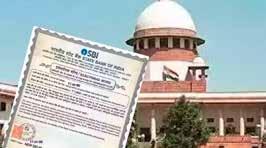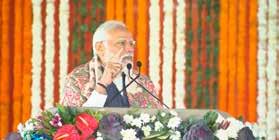




A five-judge constitution bench headed by Chief Justice DY Chandrachud said there is 'no manner of doubt' that the SBI is required to disclose complete details of the bonds
The Supreme Court on Monday directed the State Bank of India to make a complete disclosure of all details related to electoral bonds, including the unique bond numbers that would disclose the link between the buyer and the recipient political party, by March 21. A five-judge constitution bench headed by Chief Justice D Y Chandrachud said there is "no manner of doubt" that the SBI is required to disclose complete details of the bonds.
It directed the SBI chairman to file an affidavit before it by 5 pm on March 21 indicating that the bank has disclosed all the details.
During the hearing, the bench, also comprising Justices Sanjiv Khanna, B R Gavai, J B Pardiwala and Manoj Misra, observed that the SBI can't be selective and has to disclose all "conceivable" electoral bond details in its possession, including unique bond numbers that would disclose the link between the buyer and the recipient
political party.
The bench said the apex court had, in its verdict in the electoral bonds case, asked the bank to disclose all the details of the bonds and it should not wait for further orders on this aspect.
"We had asked all details to be disclosed by the SBI which includes electoral bond numbers as well. Let SBI not be selective in disclosure," the bench orally said during the hearing.

Last week, the top court issued a notice to the country's largest bank to explain the reasons for the nondisclosure of unique alphanumeric numbers in compliance with its directions, saying the SBI was "duty bound" to reveal them.
On April 12, 2019, the apex court issued an interim order directing that the information about the donations received and donations which will be received must be submitted by political parties to the EC in a sealed cover.


A company founded by BJP Rajya Sabha MP from Andhra Pradesh, C.M. Ramesh, purchased electoral bonds worth ₹5 crore weeks after it bagged the ₹1,098-crore Engineering, Procurement and Construction (EPC) contract for the Sunni hydroelectric project in Himachal Pradesh. This tranche was purchased just ahead of the Assembly elections in Tripura, Meghalaya, and Nagaland. Two months later, the company again purchased bonds worth ₹40 crore.
How companies raided by central agencies went on to purchase electoral bonds




New Delhi: The Bajaj group is the largest donor of electoral bonds to the Aam Aadmi Party (AAP) according to the party’s submission to the Election Commission of India (ECI) which subsequently went to the Supreme Court and was published by the poll body on its website on Sunday (March 17). The list includes the names of the donors of electoral bonds worth Rs 5.75 crores received by the party between April 23, 2018 to May 25, 2019. According to Supreme Court mandated data published by the EC earlier this week, the AAP has received a total of Rs 65.45 crores between April 18, 2019 to July 26, 2023.

At Rs 509 crore, ‘Lottery King’
Santiago Martin is DMK’s biggest donor through electoral bonds ‘Lottery King’ Santiago Martin’s company Future Gaming and Hotel Services Private Ltd was the biggest donor to the Dravida Munnetra Kazhagam.
As per numbers filed by the DMK to the Supreme Court in a sealed cover, the party received Rs 656.5 crore through electoral bonds between April 2019 and November 2023, out of which Rs 509 crore was donated the Coimbatore-based Future Gaming. Project Electoral Bond’s detailed profile of Santiago Martin had revealed his ties with the DMK. The disclosures made by the Election Commission earlier revealed that Martin topped the list of electoral bonds buyers, purchasing bonds worth Rs 1,368 crore. Who received the remaining bonds worth Rs 859 crore given by Martin is not known yet.

rime Minister Narendra Modi's assertion of a corruption-free government faces severe scrutiny following the Supreme Court's ruling against the electoral bonds scheme, labeling it "illegal" and "unconstitutional."
The scheme, purportedly aimed at bringing white money into politics, has come under fire for facilitating anonymous contributions, particularly benefiting the BJP.
Former Finance Minister Arun Jaitley's claims of corporate support for the scheme stand debunked, as evidenced by the disproportionate contributions from obscure companies, potentially serving as fronts for larger entities.
The revelation prompts questions about potential money laundering and quid pro quo arrangements, echoing Chief Justice of India D.Y. Chandrachud's concerns during the case hearing.
Allegations of institutionalized extortion by investigative agencies like the Enforcement Directorate (ED) and Income Tax department further tarnish the government's
anti-corruption image. Instances of companies contributing substantial sums via electoral bonds following investigations raise suspicions of coercion and misuse of power.
Opposition leader Rahul Gandhi accuses Modi of orchestrating the "biggest extortion racket" through electoral bonds. The opposition vows to escalate the campaign against Modi, highlighting the skewed distribution of funds, with the BJP receiving the lion's share.
The removal of donation limits and anonymity in electoral contributions under the electoral bond scheme exacerbates corruption risks, contrasting with the previous transparency measures. Revelations of major contributors like Vedanta amid ongoing investigations raise questions about their involvement in government projects and potential conflicts of interest. As the electoral bond scandal unfolds, it promises to dominate the discourse in the lead-up to the Lok Sabha elections. Despite potential distractions from the government, the opposition finds a potent issue to challenge Modi's credibility, signaling a turbulent political landscape ahead.











